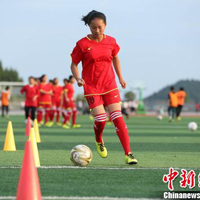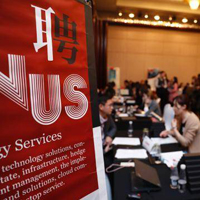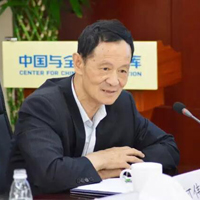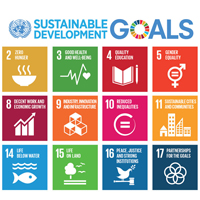-

【China Daily】 Shanghai spirit
Qingdao summit primes SCO to play more substantial role on world stagePresident Xi Jinping has called for a more open world economy, labeling moves toward protectionism as "self-centered and short-sighted".Xi re-emphasized his commitment to globalization in his keynote speech to the plenary session of the Shanghai Cooperation Organization Summit in Qingdao, Shandong province, on June 10."We should uphold WTO rules and support the multilateral trading system so as to build an open world economy," he said.The president said the SCO, which was formed in 2001 and is based on the concept of the "Shanghai Spirit", the organization’s underlying principle, was a model of what countries could do if they worked together."The ’Shanghai Spirit’, transcending outdated concepts such as clash of civilizations, Cold War and zero-sum mentality, has opened a new chapter in the history of international relations, and gained increasing endorsement of the international community," he said.Qingdao was the first SCO summit since June last year in Astana, Kazakhstan, when India and Pakistan became full members, bringing more than 1.5 billion additional people to the grouping.These nations have added a South Asian dimension to the organization, whose full members before the two new entries were Russia, Kazakhstan, Kyrgyzstan, Tajikistan and Uzbekistan, in addition to China.The SCO is now a formidable organization, with its full members taking in around half of the world’s population and a quarter of global GDP. It also has four observer members (Afghanistan, Belarus, Iran and Mongolia) as well as six dialogue partners (Azerbaijan, Armenia, Cambodia, Nepal, Turkey and Sri Lanka).Among the key announcements at this year’s summit was a commitment by China to establish a 30 billion yuan ($4.7 billion; 4 billion euros; £3.5 billion) special lending facility within the framework of the Interbank Consortium of the SCO.The facility is likely to dovetail with China’s Belt and Road Initiative and provide funding for infrastructure and investment projects in the region.China also committed to train 2,000 law enforcement officers within the SCO member countries over the next three years to strengthen law enforcement. It also will provide 3,000 training opportunities for SCO member countries.Leaders of the SCO members signed 23 cooperative documents covering everything from security and politics to economics and culture.Chinese Foreign Minister Wang Yi said the summit, the first to be held in China outside of either Shanghai or Beijing, was a "new landmark" in the organization’s history, adding that it had concluded with "the most fruitful outcomes".Many observers at the summit believed that one of the big differences between this summit and previous ones was that the organization has broadened its scope beyond focusing primarily on security issues.He Weiwen, a former economic and commercial counselor in the Chinese consulates general in San Francisco and New York, says the SCO has set itself a bold agenda."In the past, the SCO has been focused mostly on security in Central Asia, but at this summit there was a focus also on global governance issues, the multilateral trading system, which is facing severe challenges currently with the threat of protectionism, and economic issues generally," he says.Khalid Taimur Akram, executive director of the Center for Global and Strategic Studies based in Islamabad, Pakistan, also says it was an evolution."To date, the SCO has largely concentrated on regional nontraditional security governance and specifically its fight against regional terrorism, ethnic separatism and regional extremism," he says."But the SCO Charter sets out a broad range of other objectives and areas of cooperation, which go far beyond security concerns, and this has great potential for further regional integration."Some also contrasted the summit, which endorsed the China-sponsored initiative of building a community of a shared future for mankind, with the G7 meeting of developed nations, which took place in Quebec on June 8 and 9.Former counselor He, also co-director of the China-US/EU Study Center at the China Association of International Trade, says the obvious difference was the mutual respect the SCO members had for each other."All the members have different positions and values, yet they respect each other and seek to work together to achieve something of mutual benefit. On that basis, we have the harmony of good neighbors," he says."This was not the case with the G7. (US President Donald) Trump hasn’t respected multilateral trade rules and has imposed tariffs unilaterally, taking no account of others."Jon R. Taylor, professor of political science at the University of St. Thomas in Houston, Texas, also believes there was a sharp contrast between the outcomes at Qingdao and Quebec."While Xi projected calm, creative statesmanship at the summit and was able to project a win-win consensus, by contrast Trump looked like a man out of his league," he says.He adds that Trump was "stuck in the failed economic policies of the 1920s and happy to reject the West’s long-term consensus".Luigi Gambardella, president of ChinaEU, a Brussels-based internet and telecommunications platform for business leaders, agrees that the summit delivered a united message."The summit produced a success in demonstrating the unity among member countries as well as leaders’ will and commitment in multilateralism and cooperation," he says.Wang Huiyao, president of the Centre for China and Globalization (CCG), a leading Beijing-based think tank, believes there is now a real synergy between the SCO and China’s Belt and Road Initiative."I think this gives the SCO real future potential, because China’s Belt and Road Initiative has this large involvement with Central Asia. They go hand in hand, and if China can get SCO countries to cooperate and work with the Belt and Road, it is a very important path for future success and one that could transform the whole region," he says.Ivona Ladjevac, head of the regional center for the Belt and Road Initiative at the Institute of International Politics and Economics in Belgrade, Serbia, also believes this to be the case."The importance and value of the SCO is recognized by China in the scope of the Belt and Road Initiative. Namely, not only that the SCO guarantees a secure environment, but it also guarantees smooth economic development," she says.Xi, at a banquet on the eve of the summit, linked the "Shanghai Spirit" to Confucianism, particularly relevant to this year’s meeting since Shandong, where it was being held, was the birthplace of the great Chinese philosopher.He said there was much in common between Confucianism, with its emphasis on unity and harmony, and the values of the SCO, which are based on mutual trust, mutual benefit, equality, consultation, respect for diversity of civilizations and the pursuit of common development.Wang Huiyao, also a counselor to the State Council, China’s Cabinet, says the summit also gave "Shanghai Spirit" a new meaning."This is a really big idea, and it has been emboldened by this summit. Building a community of a shared future for mankind, which has been ratified by all the members, will be a path to future success for the whole region," he says.The summit set a very strong platform for the SCO to move on to play a more substantial role on the world stage.B.R. Deepak, a professor at the Centre for Chinese and South East Asian Studies at Jawaharlal Nehru University in New Delhi, says the SCO is now one of the most successful multilateral organizations in the world and is a new model for regional economic and security cooperation."With India and China as its members, the contribution they are making together with other members to global economic growth and prosperity is significant," he says."The inclusion of more members, and perhaps further expansion into the Middle East and Europe, will turn the bloc into a real Eurasian organization."Former trade diplomat He says, however, that the SCO was not trying to rival the G7 - even though its members now had a much larger population."The SCO is not about challenging the existing world order and, indeed, it has a cooperative relationship with both the World Bank and the International Monetary Fund," he says."There is no intention of rivaling the G7, since its members still lead the world in terms of technology, the size of their economics and their strength in finance. We need to work with them."From China Daily,2018-6-17
2018年6月19日 -

【Ecns.cn】 The China story behind a World Cup without Chinese players
Mo Qiu, from Guizhou Province, a flag-bearer of the opening ceremony of 2018 World Cup, practices in the football field. (Photo/China News Service)(ECNS) - Though there is no Chinese national team at the 2018 World Cup in Russia, a great variety of Chinese elements are part of the sporting event, also one of the world’s biggest marketing opportunities.Without Chinese players on the field, the World Cup will have nine foreign players who also compete in the Chinese Super League, the largest number ever. Renato Augusto, a Brazilian professional footballer, plays as a midfielder for Beijing Guoan. Javier Alejandro Mascherano of Argentina, Jose Fonte of Portugal, Axel Witsel of Belgium and John Obi Mikel of Nigeria all play for various teams in the Chinese Super League.Compared with footballers who played in China and served for their national teams in the past World Cup, those players seem to be more competitive and powerful, an indication of the growing appeal of the Chinese Super League.Chinese fans are also expected to be a major feature in Russia’s World Cup. According to FIFA data, Chinese fans purchased 40,251 out of the 2,403,116 tickets sold, ranking ninth in the country list. Russia estimates that the number of tickets purchased by Chinese fans will reach 60,000.According to Ctrip, China’s leading online travel service provider, hotel reservations in major cities in Russia have increased by more than 50 percent year-on-year due to the World Cup and air ticket reservations for major game cities increased by 40 percent during the match period.Russian authorities predict about 100,000 Chinese fans will fly in to watch matches and travel during the World Cup. Moscow will also open a "China House" to welcome fans.There are also seven World Cup sponsors from China from fields ranging from real estate to dairy products, home appliances, mobile phones, electric cars, apparel and virtual reality technology.Chinese enterprises are also eager to undertake foreign investment and acquisitions to upgrade brands, throwing huge sums of money into World Cup sponsorships amid effort to go global, according to a report by the think-tank Center for China and Globalization.In addition to Chinese sponsors, the World Cup has more made in China products too. A Chinese company manufactures the mascot Zabivaka and is exclusively responsible for pricing and sales in countries other than Russia. Commemorative coins for the event are made by Nanjing Mint.Chinese companies also provided 67 elevators at two new venues for the event. Central China’s Hubei Province will also ship 100,000 crayfish in several flavors to Russia.From Ecns.cn,2018-6-14
2018年6月19日 -

【Ecns.cn】Overseas education with local support may reduce career barriers
(ECNS) - Educational experts said that cooperating with well-known foreign universities in running schools may be a good way to train talent that fits well into China’s growth.Data shows that the number of returned students reached 480,900 in 2017, up by 11.19 percent from 2016. Between 1978 and 2017, 83.73 percent of overseas Chinese students, totaling 3.132 million, came back after completing their studies, according to the Ministry of Education.But a report by the Center for China and Globalization (CCG) said only 32.7 percent of returnees reintegrated into society rapidly, while 54.4 percent gradually integrated and 12.9 percent have been struggling to fit in. More than 60 percent of returnees encountered problems in adapting to China’s domestic job market.Some experts said the problems come from cultural differences at home and abroad, and others believe the returnees do not understand the domestic market environment and the needs of enterprises.One possible solution is to have joint education programs with foreign universities and offer customized training for certain professions, said Guo Lei, executive dean of the Pixseed Digital Art Education Base, a talent incubator focusing on digital art fields such as games and animation.Pixseed has cooperated with Abertay University to offer a five-month Master of Professional Practice in Games Development Orientation Programme (MPPOP), which prepares Chinese students to study at the UK university for one year.This new educational model allows students to understand the status of the industry from the very beginning and then have a sound career plan. Overseas learning not only provides professional knowledge and customized courses but also work internship opportunities at top gaming companies.From Ecns.cn, 2018-6-14
2018年6月19日 -

【CGTN】What does the unpleasant end of G7 reflect?
Editor’s note: This article is based on an interview with He Weiwen, a senior fellow at the Center for China and Globalization(CCG).Trump has again grabbed the world’s attention as the US president has retracted his endorsement of the G7 joint statement, after the summit ended.The reverse of his attitude is triggered by a statement that Canadian Prime Minister Justin Trudeau made during a news conference, saying that the US’ imposing tariffs in the name of national security is "kind of insulting."It seems that the seed of dissenting opinion between the US and the other G7 countries has been planted.The US and the G7An astonishing decision, imposing tariffs on imported steel and aluminum from the EU, Canada and Mexico, made by the Washington DC has aroused criticism around the globe, including member countries of G7.Under the environment of a global trade war between the US and the EU, trade issues have obviously become the pivotal concern during the summit. And not surprisingly, the US and the G7 share a confrontational stance.However, "this does not represent a breakdown of the relation between the two sides", says He Weiwen, a senior fellow at the Center for China and Globalization, "and the US is still part of the G7."Economic issues or trade issues, to be exact, is only one of the main issues on which the G7 Summit focuses. Others include military issues, climate issues, etc.June 9, 2018: US President Donald Trump speaks to reporters, during the G7 Summit in La Malbaie, Quebec, Canada./ VCG PhotoIn terms of the trade war, the US is not likely to turn its back on the EU. According to He, the status of the US being an ally of the EU will not change as, again, these two sides only have disagreements in terms of trade.At the past G7 Summits, the US has kept a low-profile image without impulsive decisions. But, since President Trump put forward the "American First" foreign policy, the US appears to be not only high-profile, but more proactive.For example, an agreement on addressing challenges that was affecting the growth of the world economy was reached at the 2016 G7 Summit. Likewise, leaders at the 2017 G7 Summit emphasized common endeavors to end the Syrian crisis, to fulfill the UN mission in Libya and to reduce the presence of ISIS in Syria and Iraq.However, Donald Trump didn’t agree with the final section of statement, of the G7 Summit this year, about commerce, and criticized his trade allies for treating the US unfairly. He even tweeted that the America is considering tariffs on imported automobiles.The G7 and the SCOCompared with another international-level summit taken place in Qingdao, China, the Shanghai Cooperation Organization, the contrast is striking as there are no such contradictions in the SCO.During the SCO, Chinese President Xi Jinping has expressed that members of the SCO have unanimously opposed protectionism, the statement of which has echoed the content in the G7 communique. This means that free trade is in accordance with globalization and is acknowledged by most of countries.June 10, 2018: Chinese President Xi Jinping delivered a speech during the 18th Meeting of the Council of Heads of Member States of the Shanghai Cooperation Organization (SCO) in Qingdao, east China’s Shandong Province./ Xinhua PhotoNevertheless, the fact that Trump still obstinately sticks to his own intentions may bring consequences.He Weiwen says "if the country continues this way, the US would become increasingly isolated as the globalization is a tendency of time. But, meanwhile, as a superpower in the world, the power of the US cannot be underestimated because it may bring risks to multi-lateral trade".It is intriguing to notice a proposal made by Donald Trump to appeal to Russia to rejoin the G7. But Russian President Vladimir Putin shows no interest as he states, while at the SCO, that Russia has never decided to leave the G7, but it’s the truth that the economic vitality of the SCO has exceeded that of the G7.Under such a background, Russia has obviously taken up a strategically active position, and Putin is more willing to be a participant of the SCO.As He Weiwen says, the Russian president recognizes the SCO’s adherence to the WTO rules, globalization and trade liberalization and deems that achievements could be fruitful through cooperating with SCO members.He WeiwenSenior Fellow at the Center for China and Globalization(CCG)He Weiwen is a senior fellow at the Center for China and Globalization(CCG). He also serves as co-director of the China-U.S./EU Study Center at the China Association of International Trade. Previously, he served as the former economic and commercial counselor of Chinese Consulates General in San Francisco and New York.From CGTN,2018-6-10
2018年6月19日 -

【People’s Daily Online】What role could China play in global sustainable development?
After two-year implementation of the UN 2030 Agenda for Sustainable Development, China’s influence in worldwide sustainability has been greatly recognized through the Belt and Road Initiative (BRI) and South-South cooperation, a UN resident coordinator noted at a seminar in Beijing on Thursday.“The 17 sustainable development goals (SDGs) are a blueprint for global development that is human-centered, green, balanced, collaborative and inclusive, which means the social-economic and environmental sustainability are equally important, and wealthy should be fairly distributed to benefit everyone,” said Nicholas Rosellini, the UN resident coordinator, who is also the United Nations Development Program (UNDP) Resident Representative at the seminar held by the Center of China and Globalization (CCG) on June 14.Therefore, the stronger integration across sectors and stakeholders is desired to address the root cause of intractable poverty issues, as it could maximize all efforts and possible resources. For example, the South-South cooperation, an indispensable drivers of global integration, has been greatly strengthen with China’s support. A total of $60 billion aid was provided by Chinese government over the past four decades, with an approximately 10% growth since 2003, said Rosellini, adding that there are also inevitable difficulties in stimulating global sustainable development.He suggested the mix-and-match approach to deliver more positive impact, which referring to bringing China’s sci-tech development experience and customizing them depend on local environment.From People’s Daily Online,2018-6-10
2018年6月19日 -
陈宁:人工智能带动趋势变革
理事简介陈宁,全球化智库(CCG)常务理事,深圳云天励飞技术有限公司创始人兼首席执行官。 5月31日,以“魅力吴江 智创未来”为主题、由苏州市吴江区人民政府主办的2018年(第四届)中国·苏州国际机器人与智能制造大会隆重召开。据悉,此次展会特邀150多位国家“千人计划”专家、教授级别路演项目嘉宾、知名企业高管以及吴江本地企业300余人到会,交流和展示国内外智能制造领域最新研究成果,共同把智能工业推向全新的高度。其中云天励飞联合创始人兼CEO陈宁博士受邀出席并分享“人工智能打造平安智慧城市”演讲。 首先,陈宁博士在讲座中畅谈人工智能趋势,他强调人工智能将成为新一轮产业革命关键动力,引领区域创新发展全面升级。“深度学习等基础技术的发展,不断推动视觉智能算法等前沿AI技术创新升级,智能芯片则带动一系列智能终端在各种应用场景的规模化,而互联网的快速兴起产生海量数据,必将极大推动视觉智能等AI技术的迅速产业化。”他补充道。 其次,陈宁博士指出当前城市视觉系统也在人工智能技术影响下逐渐向“视觉大脑”这一“第三阶段”迈进。其中前两个阶段分别为视频监控阶段和机器检索阶段,即仅能实现视频前端采集、云端存储,查看分析主要是通过人工的“第一阶段”和能够实现前端目标检测,并在云端进行数据检索,同时实现一定程度的人机交互决策的“第二阶段”。陈博士补充道“视觉大脑”可以理解为“以云天励飞为代表的创新AI企业,以深度学习为依托,逐渐实现前端结构分析、云端数据决策,并不断推动机器自主学习在城市视觉系统工程中的深度应用。” 随后,陈宁博士向在座来宾介绍云天励飞,他提到“云天励飞作为一家人工智能领域的技术创新型企业,成立以来加速发展,2015年实现云天‘深目’系统在龙岗落地,2016年深度学习芯片2.0版加速研发,2017年‘深目’系统在深圳大部分区域以及北京、上海、杭州等二十多个省市以及东南亚、北美等多个国家落地,而在今年,我们将实现芯片2.0投片和机器闭环自主学习研发突破。”随后,陈宁博士向出席嘉宾及观众详细介绍了云天励飞的核心科技、团队构架及拳头产品等。 此外,陈宁博士拓展了云天芯片的优势及市场竞争力,展开介绍了云天芯片迭代的历程等。并在演讲的最后提出了AI产业化的应用,即AI+新警务”、“AI+新治理”、“AI+新零售”三大领域,并配合目前已落地的几大云天拳头产品深化了在场来宾对AI落地应用的理解。文章选自搜狐网,2018年6月2日
2018年6月15日 -
王辉耀:建立人才库招纳国际人才 推动未来发展
建立人才库招纳国际人才 推动未来发展 创新是引领发展的第一动力。上合组织在安全,经贸、能源、人文等方面的创新合作不断增强。目前,不论是“走出去”的企业家,还是展开“一带一路”共建的国际合作伙伴,提到最多、最迫切的诉求和问题解决方案几乎都是“人才”。近日,央视网专访中国与全球化智库(CCG)主任王辉耀,解读“国际人才”那些事儿。主动对外开放、招纳全球人才 王辉耀认为,改革开放四十年,中国建了大量的基础设施,包括整个国民经济发展到了一个新的阶段。未来可能我们在软件建设上,在人力资本建设上,是至关重要的。人才是发展的第一资源。 这对中国来讲,至关重要。虽然我们目前是个人口大国,但我们在未来要成为一个人口强国。所以在未来的全球化过程中,包括“一带一路”的过程中,包括与周边国家合作,包括与上合组织的合作,人才在里边会起到一个至关重要的作用。 中国已经到了这样一个阶段,需要用好国际人才,招揽国际人才,而且也要让中国的国际人才走向国际。这是一个双向的,走进来和走出去,都要结合起来。王辉耀认为,国际人才群体越来越大,越来越重要。上合人才培养如何实现双赢 王辉耀认为,人才培养特别重要,人才要先行。对上合组织来讲,都是一些中亚、南亚的大国。这些国家人才相对来说比较缺乏,他建议派遣我们的留学生去“一带一路”沿线国家,包括上合组织国家去留学。中国留学生到这些国家去,可能发展的空间会更大,机会更多。 另外一方面要利用当地人才。吸引他们到中国来留学,学成回国后,帮助对接和中国的发展。 我们可以去这些国家办国际学校,培养当地的人才,包括技能人才、旅游人才等。各方面的技能人才、国际化人才都是这些国家比较短缺的。要建立人力资源的人才库,推动未来发展。推广“一带一路” 我国需要更多国际性复合型人才国际性复合型人才什么样 王辉耀认为,国际性复合型人才主要包含几个方面。 第一,有一定的国际化经验。哪怕没有出过国,但有跟国际打交道的经验,或者在国际跨国公司工作的经验,国际组织工作的经验,或者在大型学术会跟国际上的人士交流的经验。总之一定要有国际交往的经验。 第二,有一定的国际视野。他们身在祖国,胸怀世界,有天下观,有全球化的视野,不光是从一个国家出发。 第三,有一定的国际化沟通能力。比如懂一种国际语言,懂某个国家的文化,甚至懂多国语言,对某个国家特别有研究,或者对某个国家的行业特别有见解。 国际化复合型人才,能够跨文化沟通,能够和各个“主义”的人相处非常好。不是说只能和中国人相处,不能和外国人相处。这种人其实是非常需要的。 因为中国要推广“一带一路”,要实施新一轮的全球化,需要大量的、千千万万的人才。要广纳天下英才,就是我们不仅需要中国培养的人才,也需要把世界人才都吸引到中国来。给他们建起人才交流的渠道、纽带、管道、网络。如果中国拥有这种国际人才的网络,在未来的全球化推动过程中,就会顺利很多。国际人才要掌握哪些技能才更有竞争力 王辉耀认为,现在更多需要培养创新型人才。人才需要到国际上去,大学时就应该加强和国际交流。比如到国际上去轮换,包括去夏令营、包括去做交换生、包括这种国际的互动等等。 目前很多名校都有这种交换生,在王辉耀看来,这种交换生比例还可以扩大。现在可能局限于教育部的一些重点学校。未来可以扩大到国内所有大学,其实各所大学都可以有自己独特的交换项目。大学非常需要做的就是培养学生的国际视野。教育往往是重要的结合点。 另外,需要吸引更多留学生来。提升我们学校的国际化比例,同时培养这些留学生,希望他们回国后能成为中国与当地的桥梁和纽带。 大学生需要更多的掌握国际语言。不光是英语,其他各种小语种,都特别需要。另外需要更多的熟悉当地国家,比如上合组织国就有很多国家,是我们现在大学生不熟悉的。这个可能是我们突破的重点。 王辉耀建议,青年要了解这些国家的文化、风俗人情、宗教、法律、包括地缘政治等,都是非常需要大学生熟悉的。我们大学生应该跟这些国家的青年结成伙伴,成为朋友。包括去这些国家旅游,也欢迎这些国家的青年到中国来旅游,短期去这些国家交流复访,包括他们到中国来参加夏令营等,都是非常好的形式。从人才流动到人才回流 王辉耀认为,中国在过去四十年发展过程当中,已经成为全球最大的留学输出国,也成了全球最大的海归国。现在形成了一个正循环,每年我们的国际人才大进大出,形成良性的循环。每年都有人不断的走向国际,获得国际经验,取得国际学位,从事国际事业。回来以后带动中国和国际的合作。 包括我们现在互联网经济、人工智能、生物医药等高科技都很发达,就是因为我们大量的人才参与了国际人才大循环。这种大循环未来可能不光是中国学生,可能国际学生都参与到中国这种国际的大循环里边,会给中国带来更大的发展和支撑。 中国影响力会随着中国的学生走向世界,也随着外国学生到中国又回到他们的国家,不断的扩大,不断的架起更大更广的人脉。国家移民管理局广纳英才 向世界发出欢迎人才的信号国家移民管理局广纳天下英才 国家移民管理局自今年4月2日挂牌成立以来,两个月内共批准1881名符合条件的外籍人士在华永久居留,相当于2017年全年审批总量。外国人永久居留制度是我国面向全球引才引智的重要制度安排。 据了解,这些取得在华永久居留资格的人员,既有诺贝尔奖得主等基础科学研究领域的科学家,应用研究领域的领军人才,高等院校、科研院所的博士生导师,国家实验室主任,还有国家“千人计划”引进人员,重点产业领域优秀企业家,专业领域的高端管理人员等外籍人才,以及他们的配偶子女。他们在服务我国经济高质量发展,推动创新发展、开放发展等方面发挥了积极作用。 王辉耀也谈了对国家移民管理局的看法,认为这是中国广纳天下英才,向全世界发出欢迎人才来华发展的信号。有了这个专门机构,与国际上很多对等单位都有了对等交流,未来能提供更多国际上成熟的经验,创造有利条件让更多天下英才参与到我国各项建设和事业发展中来。文章选自央广网,2018年6月14日
2018年6月15日